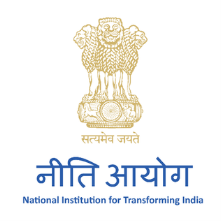UNIT V
Niti Aayog

Introduction
NITI Aayog (Hindi for Policy Commission) (National Institution for Transforming India) is a policy think tank of the Government of India, a cooperative federalist and sustainable development goal by promoting the involvement of the Government of India. Was established with the aim of achieving. Its initiatives include "15-year roadmap," "7-year vision, strategy, action plan," AMRUT, Digital India, Atal Innovation Mission, medical education reform, and agricultural reform (model land leasing law, agricultural product reform). included. Marketing Commission Act, Agricultural Marketing and Farmer-Friendly Reform Index for Ranking States), Indicators for Measuring State Performance in Health, Education and Water Management, Prime Minister's Subgroup on Rationalization of Central Assistance Schemes, Swachh Prime Minister's Subgroup Bharat Abyan, Task Force on Skill Development, Agriculture and Poverty Up, and Prime Minister's Subgroup Lecture Series on India's Transformation.
It was established in 2015 by the NDA government as an alternative to a planning committee that follows a top-down model. The NITI Aayog Council is made up of all Chief Ministers, along with the Prime Ministers of Delhi and Pondicherry, the Vice-Governor of Andaman and the Nicobar Islands, and the Vice-Chairman appointed by the Prime Minister. We also select temporary members from top universities and research institutes. These members include the Chief Executive Officer, four former civil servants, and two part-time members.
Overview
The National Organization for the Transformation of India, also known as NITI Aayog, was established by a resolution of the Federal Cabinet on January 1, 2015. NITI Ayog is the Government of India's premier policy "think tank", which provides both directional and policy input. While designing strategic and long-term policies and programs for the Government of India, NITI Aayog also provides technical advice related to centres and states.
NITI's Governing Council, chaired by the Prime Minister, is made up of the Prime Ministers of all states and the Deputy Governor of the Union Territory (UT).
In line with its reform agenda, the Government of India has formed NITIA Ayog to replace the planning committee established in 1950. This was done to better meet the needs and aspirations of the Indian people. A significant evolutionary change from the past, NITIA Ayog acts as a typical platform for the Government of India, rallying nations for national interests and thereby promoting collaborative federalism.
On June 7, 2018, the Prime Minister approved the restructuring of NITIA Ayog to include ex officio members and special invitees.
History
On May 29, 2014, the Independent Evaluation Bureau submitted an evaluation report to Prime Minister Narendra Modi recommending the replacement of the Planning Committee with a "Management Committee". On August 13, 2014, the Federal Cabinet abolished the Planning Commission and replaced it with a dilute version of India's National Advisory Council (NAC). On January 1, 2015, a Cabinet resolution was passed to replace the planning committee with the newly established NITI Aayog, the national agency for transforming India. The Dominion of India announced the establishment of NITI Aayog on January 1, 2015. The first meeting of NITI Aayog was chaired by Narendra Modi on February 8, 2015.
Finance Minister Arun Jaitley said the need for the creation of NITI Aayog: And the state is at various stages of economic development, with its own strengths and weaknesses. In this context, the "universal" approach to economic planning is outdated. India cannot be competitive in today's world economy. [3] This is a reform plan for the daily lives of the Indian people.
NITI AAYOG's Current Composition:
Chair Person
Shri Narendra Modi, Prime Minister Hon'ble
Vice-president
Dr. Rajiv Kumar
Full-time member
Ex officio members
Special invitee
Chief executive officer
Shri Amitabh Kant
Functions
NITI Aayog (National Organization for Transforming India)
(I) To actively engage the state in the light of national goals and develop a shared vision of national development priorities and strategies.
(II) National Institute of Labour Economics (NILERD)
2. NITI Aayog is the successor to the planning committee.
Role of NITIA Ayog
NITI Aayog is tasked with coordinating the Transforming Our World:
The 2030 Agenda for Sustainable Development (called the SDGs). Moving forward from the Millennium Development Goals (MDGs), the SDGs have evolved through a long and comprehensive process to achieve between 2016 and 2030. The SDGs covered 17 goals and 169 related goals resolved at the UN Summit on September 25-27, 2015, with India represented at the Prime Minister's level. These SDGs will stimulate, coordinate and achieve action for 15 years in areas of great importance to humanity and the planet.
The immediate challenge for NITI Aayog is not only to collect data on the SDGs on a regular basis, but also to achieve goals and goals quantitatively, but also to act proactively to maintain a high level of quality. The Ministry of Statistics Program Implementation (MoSPI) has already conducted parallel exercises on interaction with ministries to develop indicators that reflect the goals of the SDGs.
To accomplish these tasks, goals and goal draft mapping were carried out in consultation with MoSPI as the first step for the proposed nodes and other ministries. In addition, as an example, the Central Sponsor Scheme (CSS), which includes the "Core", "Core" and "Optional" schemes implemented by the state, maps with some of the recent initiatives undertaken by the central government. It has been. In addition, ministries implement a central sector scheme, and states also implement various state skims along one or more SDGs. This mapping can be accessed from the NITIA Ayog site niti.gov.in.
NITI Aayog is working with RIS to hold discussions on the SDGs in New Delhi from February 9-10, 2016 with stakeholders such as states, ministries, academia, international organizations and NGOs.
Purpose
 References:
References: